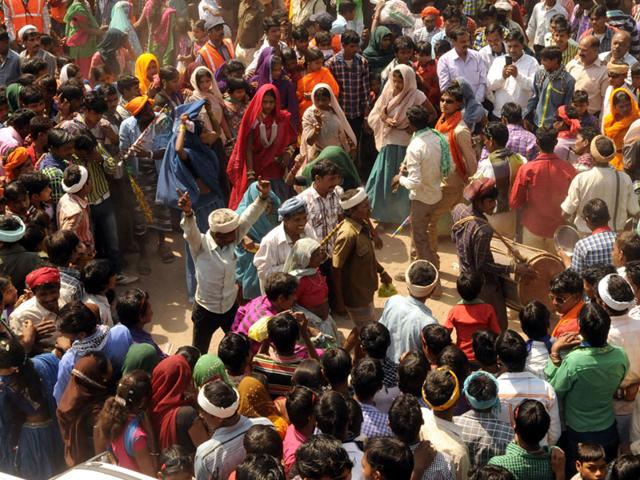MP: Tribals object to 'distorted' Bhagoria portrayal, say it's not a love festival
Tribals in Madhya Pradesh's Jhabua and Alirajpur districts have objected to the alleged distorted portrayal of the century-old Bhagoria fair which is widely publicised as a festival that allows young boys and girls to elope after choosing their partners.
Tribals in Madhya Pradesh's Jhabua and Alirajpur districts have objected to the alleged distorted portrayal of the century-old Bhagoria fair which is widely publicised as a festival that allows young boys and girls to elope after choosing their partners.

Expressing their concern for the first time, tribals told Hindustan Times that Bhagoria fair was not organised exclusively to allow young women and men to elope after liking each other.
"They can do it during anytime of the year. There is no need for them to wait till Bhagoria," said 55-year old Kanubhai Bilwal, a Bhil of Ghatia village in Jhabua district.
"It is no Valentine Day or any love festival. Neither, it is an introductory meet as boys and girls have complete freedom to interact and move out round the year," said Shamsher Singh Patel of Sondhwa (Alirajpur district).
He said Bhagoria fair is a socio-cultural occasion where tribals meet their friends, relatives and acquaintances.
The one-day fair is organised at several places on different days around Holi every year in western Madhya Pradesh's tribal-dominated Jhabua and Alirajpur districts.
Bhagoria fair's root is traced to times when there were no means of transport, communication to meet friends and relatives. As a result, tribals began to assemble around Holi after the harvest.
The fair draws a large number of outsiders, including foreigners, to see tribesmen sing, dance, play colours, eat, drink and interact with their community members.
Shankar Jamara, a Bhil from Silikhodri village (Jhabua district), said Bhagoria fair showcases the openness of tribal society.
"Women and men dance together. Rapes are unheard of. If a man elopes with woman and brings her at his house, they are considered to be married. No wedding ritual is required," the 22-year-old said.
"If not satisfied, the woman can return to her parents. Her father then arranges another match for her," he said.
Bhima Bhai, a resident of Roopgarh in Jhabua, is peeved at the increasing intervention of politicians and outsiders.
Politicians are now taking out rallies during Bhagoria to impress voters while outsiders visit the fair to eve tease tribal girls.
"It is unacceptable. They disturb our natural, traditional way of meeting people and having fun. They also spread misconception about Bhagoria," he said.
The state government's attempt to declare awards for the best Bhagoria fair hasn't found takers as tribals feel it is an attempt to commercialise a social gathering and to introduce competition where none exists.
"We don't sing and dance to outperform each other. We do it just for our enjoyment," said Rajaram Katara, a post-graduate student from Dharampuri.
Rana Sajjan Singh, the ruler of erstwhile Mathwad princely state (Alirajpur district) who invites foreigners to watch Bhagoria fair every year, agrees.
He said police's insistence on closing the fair by 3.30pm gives little time to tribals to enjoy and small businessmen to sell their wares.
"It should be allowed to continue till 5 pm as the fair actually starts by 12 noon because tribals come from upto 50 kilometres to participate in festivities," Singh, 73, told HT.
Jhabua and Alirajpur regions are considered a cultural hub for two crore tribals of western India stretching from Gujarat, Sirohi (Rajasthan) to Nashik (Maharashtra). Experts say tribal traditions are alive in totality here. In other areas, they exist in parts.




